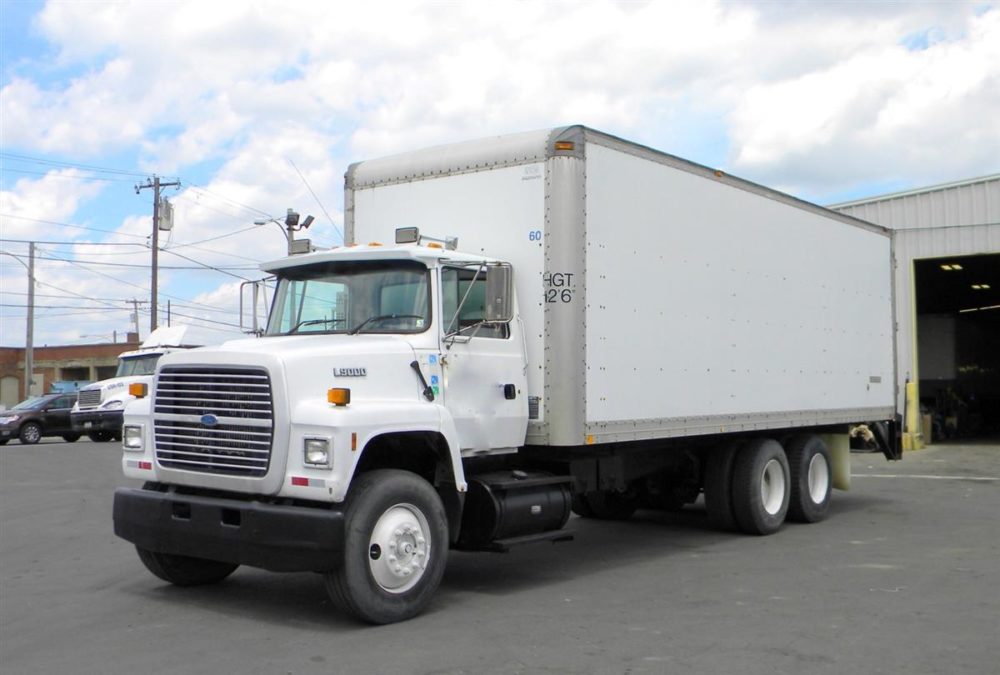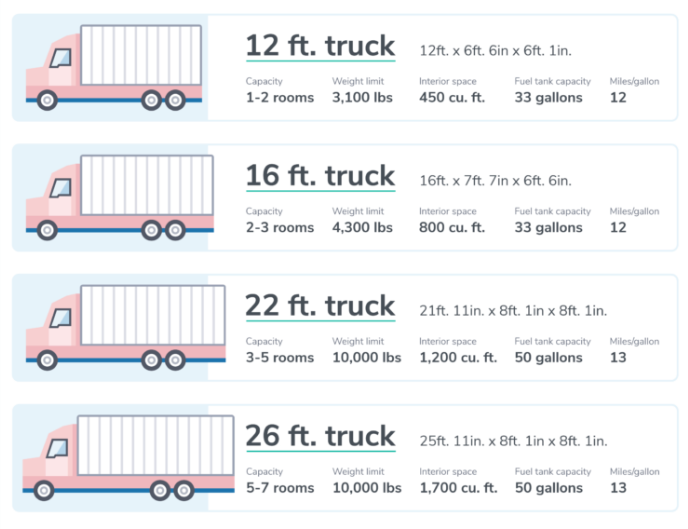A box truck generally weighs between 12,000 to 33,000 pounds depending on its size and capacity. Box trucks are commonly used for transportation and delivery services due to their versatility and storage space.
These vehicles are essential for businesses that require a reliable and efficient means of transporting goods and equipment. Understanding the weight of a box truck is crucial for safe driving and compliance with regulations. Whether you are considering purchasing a box truck for your business or are curious about their weight capacity, knowing this information can help you make informed decisions.
We will explore the factors that contribute to the weight of a box truck and why it is essential to consider these aspects.

Credit: tinyhousedesign.com
Factors Affecting Box Truck Weight
Box truck weight is influenced by various factors such as its size, load capacity, and construction materials used. These factors determine how much a box truck weighs, making it essential to consider them when calculating weights for transportation and logistical purposes.
Factors Affecting Box Truck Weight When considering the weight of a box truck, several factors come into play. These factors impact the overall weight of the vehicle, which is essential to understand for various purposes such as transportation regulations, fuel efficiency, and maintenance. The overall vehicle design, material composition, and size of the box are some of the primary elements that influence the weight of a box truck.Overall Vehicle Design
The design of a box truck plays a crucial role in determining its weight. The chassis, engine, and suspension system are key components that contribute to the overall weight. Heavy-duty trucks typically have sturdier components, resulting in a higher weight.Material Composition
The materials used in the construction of a box truck significantly impact its weight. Steel and aluminum are commonly used for the frame and body, with steel being heavier than aluminum. The choice of materials directly affects the total weight of the vehicle.Size Of The Box
The size of the box or cargo area also affects the weight of the truck. Larger boxes with more storage capacity add to the overall weight, while smaller boxes reduce it. Additionally, the type of goods being transported can also impact the weight, as heavy cargo increases the overall load. In conclusion, understanding the factors that affect the weight of a box truck is essential for making informed decisions regarding its use and operation. By considering the overall vehicle design, material composition, and box size, businesses and operators can optimize their fleet management and ensure compliance with transportation regulations.Average Box Truck Weight
When considering the total weight of a box truck, it’s important to understand the variations based on the specific type or category of box trucks. Let’s delve into the different weight ranges of lightweight, standard, and heavy-duty box trucks to give you a comprehensive overview.
Weight Range Of Lightweight Box Trucks
Lightweight box trucks typically range from 5,000 to 12,000 pounds due to their compact size and reduced load capacity. These trucks are ideal for smaller deliveries or local transport needs.
Weight Range Of Standard Box Trucks
Standard box trucks fall within the weight range of 12,000 to 26,000 pounds. They offer a balance between size and capacity, making them suitable for a wide range of commercial and industrial applications.
Weight Range Of Heavy-duty Box Trucks
Heavy-duty box trucks, designed for larger loads and long-distance transport, typically weigh between 26,000 to 33,000 pounds. These trucks are built to handle substantial payloads and endure demanding travel conditions.
Common Payload Capacities
Box trucks come in various sizes to accommodate different payload capacities. Understanding the common payload capacities can help you choose the right box truck for your transportation needs.
Light Payload Capacity Box Trucks
Light payload capacity box trucks are ideal for smaller loads and local deliveries.
Standard Payload Capacity Box Trucks
Standard payload capacity box trucks suit medium-sized loads and frequent deliveries.
Heavy-duty Payload Capacity Box Trucks
Heavy-duty payload capacity box trucks can handle large, heavy items for long-distance transport.
Credit: www.moving.com
Importance Of Knowing Box Truck Weight
The weight of a box truck is a crucial factor that affects various aspects of its operation. Understanding the weight of a box truck and its significance is essential for legal compliance, safety, and cost-efficiency. This information not only ensures regulatory adherence, but also promotes safe and efficient transportation. Let’s delve into the importance of knowing box truck weight in detail.
Legal Compliance
Knowing the weight of a box truck is imperative for legal compliance. Many jurisdictions have specific regulations regarding the maximum weight a truck can carry on public roads. These regulations are in place to protect infrastructure and prevent accidents caused by overloaded vehicles. By being aware of the weight of the box truck, companies can ensure they are in compliance with these regulations, avoiding potential fines and legal issues.
Safe Loading And Operation
Understanding the weight of a box truck is crucial for safe loading and operation. Overloading a truck can lead to instability, reduced maneuverability, and increased braking distances, posing significant safety risks for both the driver and other road users. By knowing the truck’s weight capacity, proper loading and safe operation can be maintained, reducing the likelihood of accidents and injuries.
Fuel Efficiency And Cost
The weight of a box truck directly impacts fuel efficiency and operational costs. Heavier trucks require more fuel to operate, leading to increased expenses over time. By knowing the weight of the truck, companies can optimize their loading practices to minimize fuel consumption, ultimately reducing operational costs and environmental impact.
Measuring And Calculating Box Truck Weight
When it comes to box trucks, one of the crucial factors to consider is the truck’s weight. Measuring and calculating the weight of a box truck is essential for several reasons. It provides valuable information about the truck’s capacity, safety, and compliance with road regulations. In this section, we will explore three key aspects of box truck weight: tare weight, gross vehicle weight rating (GVWR), and payload capacity calculation.
Tare Weight
Tare weight refers to the weight of an empty box truck. It includes the weight of the chassis, engine, fuel, oil, and other fixed components.
Gross Vehicle Weight Rating (gvwr)
Gross Vehicle Weight Rating, also known as GVWR, represents the maximum weight that a box truck can carry, including its own weight and the weight of the load.
Payload Capacity Calculation
Payload capacity calculation is crucial to determine the maximum weight of the load a box truck can carry safely. It is calculated by subtracting the tare weight from the GVWR. The result represents the weight that can be loaded onto the truck without exceeding its specified capacity.
Here’s an example:
| Tare Weight | GVWR | Payload Capacity |
|---|---|---|
| 10,000 lbs | 20,000 lbs | 10,000 lbs |
- The tare weight of the box truck is 10,000 lbs.
- The GVWR of the box truck is 20,000 lbs.
- The payload capacity of the box truck is 10,000 lbs (GVWR – tare weight).
It’s important to note that exceeding the payload capacity of a box truck can lead to safety hazards, increased wear and tear on the vehicle, and potential legal consequences. Therefore, accurate measurement and calculation of box truck weight are essential for maintaining optimal performance and compliance.

Credit: twitter.com
Frequently Asked Questions Of How Much Does Box Truck Weigh
What Is The Weight Of A 26ft Box Truck?
A 26ft box truck typically weighs around 12,000 to 15,000 pounds, depending on its specific make and model.
How Much Does A 26ft Penske Truck Weigh?
A 26ft Penske truck weighs approximately 9,900 pounds.
How Much Does A 20 Foot Box Truck Weigh?
The weight of a 20-foot box truck typically ranges from 12,000 to 16,000 pounds.
How Much Does A 26ft U-haul Truck Weigh?
A 26ft U-Haul truck weighs approximately 9,010 lbs. It is important to verify the specific weight with U-Haul before use.
Conclusion
Understanding the weight of a box truck is crucial for proper handling and compliance. By being knowledgeable about the weight specifications, you can ensure safety and adherence to regulations. Remember to consider the weight of your cargo and adhere to applicable laws and guidelines.
Keeping these factors in mind will contribute to successful and safe box truck operation.
